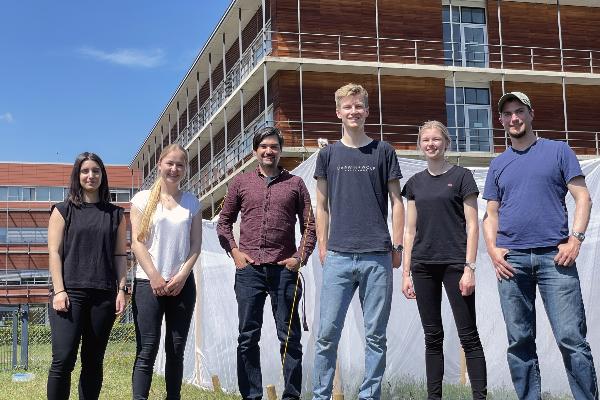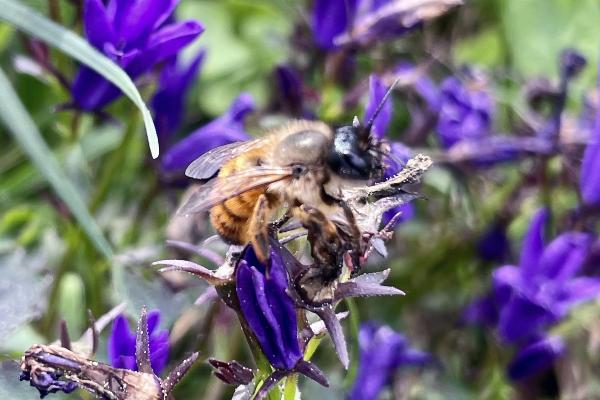The pandemic has made it a little easier to explain Professor Alexander Keller’s research area: “Today, everyone knows that door handles can be veritable ‘trading stations’ for micro-organisms and that Covid may have been transmitted to humans by a bat,” the biologist says, “and there are billions of organisms that constantly experience such ‘leaps between hosts’.” That said, the specific leap that Keller is investigating involves much smaller hosts than humans: It takes place between bees and flowers.
“Above and beyond the interaction between bees and flowers, my group conducts research into why a three-way interaction between these organisms and relevant micro-organisms such as fungi and bacteria is also important to important processes – such as pollination – within this ecosystem,” Keller explains. “One key insight gleaned from our research is that, for bees, flowers constitute similar trading stations for micro-organisms. For the plants, on the other hand, the pollinators act as vectors for microbes over longer distances. In both cases, this can lead to the spread of micro-organisms both intraspecifically (within one species) and between different species.”
In particular, the professor’s team has been able to show that this transfer of microbes between bees and flowers can “have a useful effect by positively impacting on the hosts’ fitness, but can also have a negative influence in the case of pathogens, for example”.
Since last summer, Keller has been leading the Department of Cellular and Organismic Networks at the LMU Biocenter. His research concentrates on a combination of microbial ecology, bioinformatics and new sequencing technologies. Much of his time is thus devoted to the documentation, explanation and functional characterization of the three-way relationship between bees, flowers and the microbiome.
While earlier research in this field has often focused on social bees in general and Western honeybees in particular, Keller is interested primarily in wild bees – especially those known as ‘solitary bees’. “Of the 1,500 or so species of bees in Germany, 89 percent live solitary lives,” the biologist says. “They live alone, rearing their young in individual and mostly isolated nest chambers. They are incredibly important to the pollination of countless wild plants, but also for cultivated crops such as rapeseed and various kinds of fruit and vegetables.”
Pattern analysis with artificial intelligence
“What we have been able to show in recent years is that microbiomes are not usually static, but are subject to constant interaction with the ecosystem. And this dynamic interaction is linked to substantial variability in the functional impacts of the microbiomes on the host.” The researchers have, for example, verified correlations between the microbiomes and nutrients in the bees’ food, although their importance to bees’ and flowers’ resistance to disease is also being studied. “A healthy microbiome makes it harder for a pathogen to trigger infections in bees. But if it is impaired, as in cases where pesticides are used, for example, then diseases are inevitable.”
The biologists investigate the transfer of bacteria from bee to flower to bee in field trials, but also in experiments conducted at the Biocenter. Microbes from natural samples are isolated, cultivated in the laboratory and sequenced to decode the genome. In the process, Keller’s working group develops new molecular techniques to prepare the ecological samples for next-generation sequencing. This work goes hand in hand with corresponding in silico methods, i.e. computer simulations. "What sets us apart is that we study interaction between bees and flowers, between bees and microbes and between flowers and microbes – and that with the aid of modern molecular and computer-based technologies such as high-throughput sequencing, bioinformatics, statistics and artificial intelligence (AI)." Machine learning in particular supports the analysis of vast quantities of highly complex data in an attempt to explain certain patterns, for example. “I study patterns and structuring forces in microbial communities in all kinds of biospheres.” Keller’s interest embraces various levels, from frequency and diversity patterns to phylogenetics and functionality to environmental and spatial influences.
Bees’ varying pollen preferences are also investigated. “For example, whether or not they collect pollen mainly from composite plants has an effect on the structure and, hence, on the functionality of their microbiome. For insects, for instance, different pollens can be toxic and hard to digest. Their microbes help the bees to detoxify, digest and upgrade the biochemical properties of these pollens, but the microbes that are there have to suit the food,” Keller explains.
Phylogenetic family trees
After studying biology at the University of Karlsruhe, Keller wrote his diploma thesis at the Department of Animal Ecology and Tropical Biology at Julius-Maximilians-Universität (JMU) Würzburg. At the same university’s Department of Bioinformatics, he then earned his doctorate in 2010 on the subject of the Secondary (and tertiary) structure of the ITS2 and its application for phylogenetic tree reconstructions and species identification. Starting in 2011, he headed the Molecular Biodiversity Group, predominantly at JMU’s Center for Computational and Theoretical Biology. He submitted his postdoctoral thesis, entitled A microbiotic perspective on plant-animal interactions, in 2017. Keller has served as a visiting scholar at the Hitoy Cerere National Park in Costa Rica, the University of Brunei, the Edinboro University of Pennsylvania and three Australian universities (University of the Sunshine Coast, Griffith University and University of New England). Since July 2021, he has been Professor of Cellular and Organismic Networks at LMU.
There were many reasons why Alexander Keller opted to come to LMU. “First of all, the Faculty of Biology here has tremendously good research groups.” Given the interdisciplinary nature of his research area, however, cooperation between different faculties is also very important to him. “We work in the field, in the laboratory, but also a lot on the computer. That doesn’t always make things easy, but it is exciting and facilitates cooperation with many other disciplines.” Due to his focus on bioinformatics, Keller has nurtured a keen interest in informatics and – in particular – in AI, another area in which LMU is very well placed.
A holistic view of hosts and microbes
Keller can also envisage cooperating with the Faculty of Mathematics and Informatics, above all in the field of algorithms, “because we also program a lot of our own algorithms and software”.
Other touchpoints exist with medicine: “We are also interested in the possibility that has come up in basic human medical research of a bridge between microbiomes and various diseases – including neural ones, for example.” Keller goes on: “From trials conducted by other working groups we know that bees with an impaired microbiome can exhibit deficits in learning or in their physical development. Similar interactions are known among humans, too. Accordingly, bees often cannot engage in optimal pollen collecting behavior or suffer from a higher mortality rate.” Keller’s research is, of course, also of significance in the context of nature conservation. For this reason, the biologist is cooperating on farming and ecological issues with institutions such as the Technical University of Munich (TUM). As part of a JMU collaborative venture in the Andes, he is also studying the biodiversity of the insect microbiome, which permits indirect conclusions to be drawn about the influence of climate change.
“Global climate change is currently exposing us to a crisis of biodiversity. The frequency and diversity of many groups of plants and animals is in sharp decline,” Keller concludes. “This decline is of significance both to important associated ecosystem processes and to agriculture. And our research shows that we must analyze not just flora and fauna, but also their microbiomes.”


